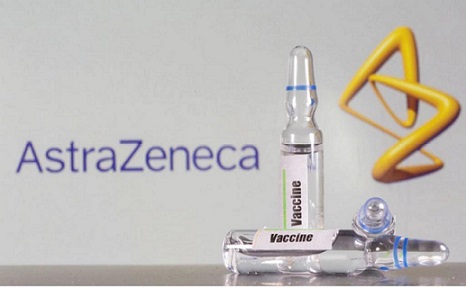New AstraZeneca COVID-19 vaccine data further support its use as third dose booster

Positive results from a preliminary analysis of an ongoing safety and immunogenicity trial (D7220C00001) showed that AstraZeneca COVID-19 vaccine (ChAdOx1-S [Recombinant]), when given as a third dose booster, increased the immune response to Beta, Delta, Alpha and Gamma SARS-CoV-2 variants, while a separate analysis of samples from the trial showed increased antibody response to the Omicron variant.
The results were observed among individuals previously vaccinated with either AstraZeneca COVID-19 vaccine or an mRNA vaccine.
A separate Phase IV trial reported in a preprint with The Lancet on SSRN showed that a third dose of AstraZeneca COVID-19 vaccine substantially increased antibody levels following a primary vaccine series with CoronaVac (Sinovac Biotech).1
Sir Mene Pangalos, Executive Vice President, BioPharmaceuticals R&D, AstraZeneca, said: “AstraZeneca COVID-19 vaccine has protected hundreds of millions of people from COVID-19 around the world and these data show that it has an important role to play as a third dose booster, including when used after other vaccines. Given the ongoing urgency of the pandemic and AstraZeneca COVID-19 vaccine’s increased immune response to the Omicron variant, we will continue to progress regulatory submissions around the world for its use as a third dose booster.”
Professor Sir Andrew J Pollard, chief investigator and director of the Oxford Vaccine Group at the University of Oxford, said: “These important studies show that a third dose of AstraZeneca COVID-19 vaccine after two initial doses of the same vaccine, or after mRNA or inactivated vaccines, strongly boosts immunity against COVID-19. The Oxford-AstraZeneca vaccine is suitable as an option to enhance immunity in the population for countries considering booster programmes, adding to the protection already demonstrated with the first two doses.”
Barbara Nel, Country President, Africa, AstraZeneca, said: ““The latest AstraZeneca COVID-19 vaccine data show the vaccine, when used as a third dose booster, increases the immune response against all variants of concern, including when used after other vaccines.
This is of particular importance considering the spread of the Omicron variant. This is really positive news for Sub-Saharan Africa, where over 70M doses of the AstraZeneca COVID-19 vaccine have been supplied, and where countries are striving to attain their vaccination targets and some are beginning to roll out booster programmes.”
The D7220C00001 safety and immunogenicity trial showed that AstraZeneca COVID-19 vaccine continued to be generally well tolerated. Further analyses from the trial are expected in the first half of 2022.
D7220C00001 Trial
D7220C00001 is an ongoing partially double-blind, randomised, multinational, active-controlled trial in both previously vaccinated and unvaccinated adults to determine the safety and immunogenicity of AstraZeneca COVID-19 vaccine and AZD2816, a vaccine developed for the prevention of COVID-19 caused by the Beta variant of the SARS-CoV-2 virus.4
Immunogenicity data for the preliminary analysis were from samples taken 28 days after the third dose booster vaccination. Individuals included in the preliminary analysis of the trial had been fully vaccinated with two doses of AstraZeneca COVID-19 vaccine (n=700), or an mRNA-based vaccine (n=600), prior to being given a third dose booster vaccination of AstraZeneca COVID-19 vaccine or AZD2816 at least three months after their last injection.
RHH-001 Phase IV Trial
The Phase IV randomized, single-blind, two-centre trial assessed the safety and immunogenicity of a third heterologous booster dose of either AstraZeneca COVID-19 vaccine, an mRNA vaccine (BNT162b2, Pfizer/BioNTech), or a recombinant adenoviral vectored vaccine (AD26.COV2-S, Janssen), compared with a third homologous booster dose of CoronaVac in Brazilian adults who had received two doses of CoronaVac six months previously. Between 16 August 2021 and 1 September 2021, 1,240 participants were randomised to receive a third dose booster in São Paulo and Salvador, of whom 1,239 were vaccinated.1
The primary outcome of the trial was non-inferiority of anti-spike IgG antibodies 28 days after the booster dose in the heterologous boost groups compared with homologous regimen.1
Vaxzevria, (ChAdOx1-S [Recombinant], formerly AZD1222)
Vaxzevria (AstraZeneca COVID-19 vaccine) was invented by the University of Oxford. It uses a replication-deficient chimpanzee viral vector based on a weakened version of a common cold virus (adenovirus) that causes infections in chimpanzees and contains the genetic material of the SARS-CoV-2 virus spike protein. After vaccination, the surface spike protein is produced, priming the immune system to attack the SARS-CoV-2 virus if it later infects the body.
The vaccine has been granted a conditional marketing authorisation or emergency use in more than 90 countries. It also has Emergency Use Listing from the World Health Organization, which accelerates the pathway to access in up to 144 countries through the COVAX Facility.
Under a sub-license agreement with AstraZeneca, the vaccine is manufactured and supplied by the Serum Institute of India under the name COVISHIELD.
AstraZeneca
AstraZeneca (LSE/STO/Nasdaq: AZN) is a global, science-led biopharmaceutical company that focuses on the discovery, development, and commercialisation of prescription medicines in Oncology, Rare Diseases, and BioPharmaceuticals, including Cardiovascular, Renal & Metabolism, and Respiratory & Immunology. Based in Cambridge, UK, AstraZeneca operates in over 100 countries and its innovative medicines are used by millions of patients worldwide. Please visit astrazeneca.com and follow the Company on Twitter @AstraZeneca.
Contacts
For details on how to contact the Investor Relations Team, please click here. For Media contacts, click here
References
- Costa Clemens SA, et al. Randomized immunogenicity and safety study of heterologous versus homologous COVID-19 booster vaccination in previous recipients of two doses of CoronaVac COVID-19 Vaccine. Preprint 2021. Available at SSRN: https://ssrn.com/abstract=3989848 [Last accessed: January 2022]. Preprints with The Lancet available via the SSRN platform are not Lancet publications and have not been peer-reviewed.
- Flaxman A, et al. Reactogenicity and immunogenicity after a late second dose or a third dose of ChAdOx1 nCoV-19 (AZD1222) in the UK: a substudy of two randomized controlled trials (COV001 and COV002). The Lancet. 2021;398:981-990.
- Munro A PS, et al. Safety and immunogenicity of seven COVID-19 vaccines as a third dose (booster) following two doses of ChAdOx1 nCov-19 or BNT162b2 in the UK (COV-BOOST): a blinded, multicentre, randomised, controlled, phase 2 trial. The Lancet. 2021;398:2258-2276.
- gov. Phase II/III Study of AZD2816, for the Prevention of COVID-19 in Adults [Online]. Available at: https://www.clinicaltrials.gov/ct2/show/NCT04973449?term=NCT04973449&draw=2&rank=1 [Last accessed: January 2022].




